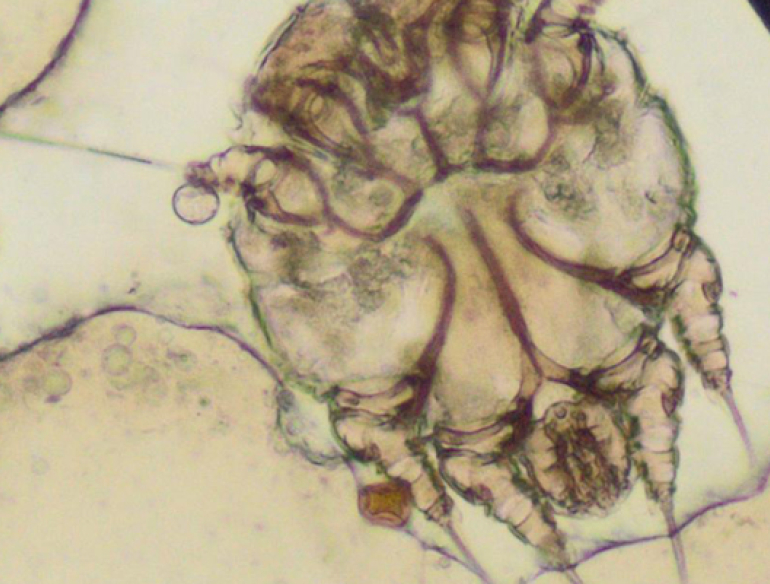Research at a Glance:
- An international study has found the anti-parasitic drug ivermectin prevents dangerous bacterial complications of scabies in Fiji when delivered on mass scale
- The drug was administered to the whole population of the Northern Division of Fiji, the largest mass drug administration study in the region
- The researchers stated the findings represent a big step forward in scabies control and would help inform international policymakers on their scabies control strategy
Republished with permission from MCRI.
An anti-parasitic drug, delivered on a mass scale, can prevent potentially dangerous bacterial complications of scabies in Fiji, according to a new study.
The research led by the Murdoch Children’s Research Institute (MCRI), the Kirby Institute at UNSW Sydney and the Ministry of Health and Medical Services of Fiji, was the largest mass drug administration study for scabies in the region with the findings a big step forward in global scabies control.
Scabies is a contagious skin condition caused by a mite which burrows into the skin. The highly contagious disease causes itching, which can lead to complications such as severe skin infections and serious bacterial infections, bloodstream infections, kidney failure and heart disease.
Ivermectin has been used for decades in the treatment of parasitic infections. After the team of researchers proved ivermectin mass drug administration can be used to prevent the transmission of scabies, Murdoch Children’s Dr Li Jun Thean and her team, in collaboration with the Ministry of Health, administered the antiparasitic drug to over 130,000 Fijians to help prevent bacterial complications.
For the study, ivermectin was administered to the whole population of the Northern Division of Fiji, which involved two doses of oral ivermectin or topical scabies cream, delivered alongside treatment for lymphatic filariasis, another parasitic disease that Fiji has been working to eliminate through mass drug administration.
The findings, published in The Lancet Regional Health - Western Pacific, found that community-wide administration of ivermectin not only reduced the burden of scabies, by treating and preventing the disease, but also reduced hospitalisations and presentations to clinics for complications usually associated with the disease.
As the world’s first study explicitly designed to investigate how ivermectin impacts on bacterial conditions associated with scabies, the findings provide key information to policymakers, including the World Health Organization who have identified scabies control with ivermectin as a high research priority.
The research team reported that, after the intervention, hospitalisations for skin and soft tissue infections due to scabies decreased by 17 per cent, and primary healthcare presentations by 21 per cent. Additionally, the number of people in the community with scabies and impetigo fell by about half.
Dr Thean said this was the largest mass drug administration study for scabies in this region and the findings represented a big step forward in global scabies control.
Dr Aalisha Sahukhan, Head of Health Protection at the Ministry of Health and Medical Services in Fiji, said scabies was an important public health issue facing her country, with the bacterial complications of the condition known to especially affect the health and wellbeing of children.
Kirby Institute Professor John Kaldor said scabies caused debilitating itch and sleep deprivation with socioeconomic consequences such as stigma, missed school and substantial need for healthcare.
“About 200 million people have scabies, predominantly in resource-poor settings which contributes to 0.21 per cent of disability. We aim to better treat scabies with our intervention in this region and hopefully reduce the number of people with scabies worldwide,” he said.
Murdoch Children’s Professor Andrew Steer said despite the tiny mite currently affecting hundreds of millions of people, it was possible to have a massive impact treating whole populations.
In 2015, research by the Murdoch Children’s, the Kirby Institute and the Fiji Ministry of Health showed that community-wide ivermectin treatment was able to reduce scabies prevalence by 94 per cent.
MCRI and its partners are also leading a global program aiming to equip low- and middle-income countries with the tools and the resources to detect, monitor and control scabies in affected communities.
The World Scabies Program was established in 2019 after securing a $10 million grant from Macquarie Group, as part of its 50th anniversary donation program to address pressing social needs.
Publication: Li Jun Thean, Lucia Romani, Daniel Engelman, Handan Wand, Adam Jenney, Jyotishna Mani, Jessica Paka, Tuliana Cua, Sera Taole, Maciu Silai, Komal Ashwini, Aalisha Sahukhan, Mike Kama, Meciusela Tuicakau, Joseph Kado, Matthew Parnaby, Natalie Carvalho, Margot Whitfeld, John Kaldor, Andrew C. Steer. ‘Prevention of bacterial complications of scabies using mass drug administration: A population-based, before-after trial in Fiji, 2018–2020’, The Lancet Regional Health - Western Pacific. DOI: 10.1016/j.lanwpc.2022.100433
*The content of this communication is the sole responsibility of MCRI and does not reflect the views of the NHMRC.
Available for interview:
Dr Li Jun Thean, MCRI PhD Student
Professor Andrew Steer, MCRI Theme Director Infection and Immunity
Media Contact:
Bridie Byrne
MCRI media manager
+61 457 365 848
bridie.byrne@mcri.edu.au
Header Image
Sarcoptes scabiei by laboratorio diagnostica ancona IZSUM, (CC BY 2.0)
